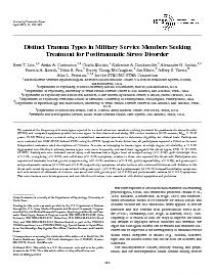Distinct Trauma Types in Military Service Members Seeking Treatment for Posttraumatic Stress Disorder
We examined the frequency of trauma types reported in a cohort of service members seeking treatment for posttraumatic stress disorder (PTSD) and compared symptom profiles between types. In this observational study, 999 service members (9.2% women; Mage = 32.91 years; 55.6% White) were evaluated using a standardized assessment procedure to determine eligibility for clinical trials. Participants were evaluated for DSM-IV-TR-defined PTSD using the PTSD Symptom Scale-Interview; all participants reported a Criterion A event. Independent evaluators rated descriptions of Criterion A events as belonging to trauma types at a high degree of reliability, κ = 0.80. Aggregated non-life-threat primary trauma types were more frequently endorsed than aggregated life-threat types, 95% CI [17.10%, 29.20%]. Participants who endorsed moral injury-self traumas had a higher level of reexperiencing (d = 0.39), guilt (hindsight bias, d = 1.06; wrongdoing, d = 0.93), and self-blame (d = 0.58) symptoms, relative to those who reported life threat-self. Participants who experienced traumatic loss had greater reexperiencing (d = 0.39), avoidance (d = 0.22), guilt (responsibility, d = 0.39), and greater peri- and posttraumatic sadness (d = 0.84 and d = 0.70, respectively) symptoms, relative to those who endorsed life threat-self. Relative to life threat-self, moral injury-others was associated with greater peri- (d = 0.36) and posttraumatic (d = 0.33) betrayal/humiliation symptoms, and endorsement of aftermath of violence was associated with greater peri- (d = 0.84) and posttraumatic sadness (d = 0.57) symptoms. War zone traumas were heterogeneous, and non-life-threat traumas were associated with distinct symptoms and problems.
Geachte bezoeker,
De informatie die u nu opvraagt, kan door psychotraumanet niet aan u worden getoond. Dit kan verschillende redenen hebben,
waarvan (bescherming van het) auteursrecht de meeste voorkomende is. Wanneer het mogelijk is om u door te verwijzen naar de bron
van deze informatie, dan ziet u hier onder een link naar die plek.
Als er geen link staat, kunt u contact opnemen met de bibliotheek,
die u verder op weg kan helpen.
Met vriendelijke groet,
Het psychotraumanet-team.
In: Journal of Traumatic Stress ISSN: 1573-6598 | 31 | 2 | 286-295
https://onlinelibrary.wiley.com/doi/epdf/10.1002/jts.22276


